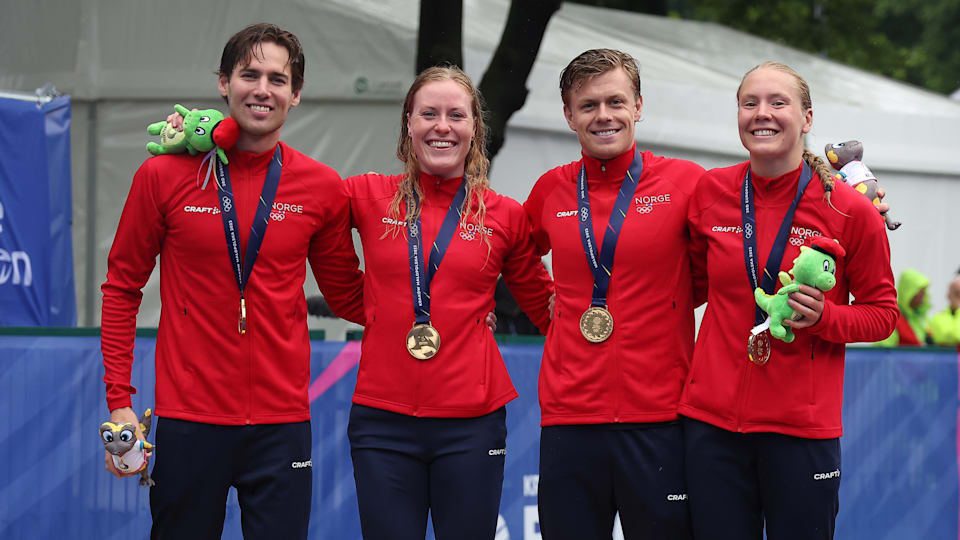Beyond Kristian Blummenfelt and Gustav Iden: Unveiling Norway's rise to triathlon dominance
The two global stars represent merely the tip of the iceberg in a formidable movement which recently swept all the titles at the European Games. Find out more about the rise of the Scandinavians in the sport.

Kristian Blummenfelt and Gustav Iden are the winners of the last two Iron-distance triathlon World Championships, arguably the most extreme one-day endurance challenge in sports.
In recent years, these two Norwegian athletes have consistently pushed boundaries and risen to become global stars.
Blummenfelt claimed Olympic gold at Tokyo 2020 in the summer of 2021, displaying an impressive surge during the challenging run leg in scorching conditions at Odaiba Marina Park. He followed up this triumph with a World Triathlon Series (WTS) title in Edmonton, Canada, a few weeks later. After taking the IRONMAN world title early last year, in June 2022 he became the first-ever man to go sub 7 hours over the same distance.
Iden, hailing from Bergen like 'Big Blu', has also made a name for himself in the triathlon world. He clinched two IRONMAN 70.3 crowns (2019, 2021), a Professional Triathletes Organisation (PTO) Championship in 2020, and shattered the course record in Kona, Hawaii, to secure the 2022 Ironman World Champs title last October.
However, Blummenfelt and Iden represent merely the tip of the iceberg in a formidable triathlon movement.
During the recent European Games held in Krakow, Poland, Norway achieved a remarkable feat by sweeping all available titles. Vetle Thorn and Solveig Lovseth first claimed individual gold medals, followed by a thrilling victory in the Mixed Relay event a few days later, where they were joined by Casper Stornes and Lotte Miller.
Despite missing out on the event's Olympic debut in Tokyo 2020, the Norwegian team has emerged as strong contenders for medals in Paris. The upcoming World Triathlon Sprint and Relay Championships (WTSRC) in Hamburg on Sunday 16 July will provide an opportunity to secure four more spots for the Games, further bolstering Norway's chances on the Olympic stage.
Arild Tveiten: The mastermind behind the rise of Norwegian triathlon
28 April 2018 marked a historic day for both triathlon and Norway.
During the WTS event in Bermuda, Stornes, Blummenfelt and Iden, accomplished an extraordinary feat by claiming gold, silver, and bronze medals, respectively, making them the first men's team to achieve a podium sweep in the series
However, the question remains: how did a nation with a population of only 5 million people and no significant prior achievements in the sport manage to emerge as a dominant force? This remarkable podium sweep was the culmination of meticulously planned and executed decade-long preparation.
The journey began in 2012 when Arild Tveiten, originally Blummenfelt's personal coach, assumed the role of Sport Director and Head Coach of the Norwegian Triathlon Federation. This transition marked a pivotal moment in the development of triathlon in Norway.
Since the very beginning Tveiten, who was a competitor himself in the ‘90s, had a very ambitious plan: “I had at that time decided that if I should take this job, I would only do it if I did it 100% and with the goal of creating the best national team in the world,” he told tri247.com.
The man who masterminded the rise of Norwegian triathlon helped build a new mentality. His mantra? No limits and no excuses.
“I used to be on the national team early in my career, and at that time we put too many limits on ourselves: it was too cold in Norway; we didn’t have the money and so on. Just bad excuses,” revealed the 53-year-old, who added: “Never put any limit on you and the team, and the goal is to be the best in the world.”
While he didn’t want to put any boundaries in terms of results, Tveiten has always had a strict view about self-discipline.
“The standard to get on the team from a performance perspective is not especially high,” he said. “But the standard in terms of internal motivation and work ethic are extremely high. If you are not willing to do the work, you can’t be on the team.”
The coach closely follows the progression of his athletes, allowing his budding superstars to grow at their own speed. And there are not many people involved: it’s mainly him and Olav Aleksander Bu, the sports scientist: “Believe it or not we are very small. We also have two part-time coaches, but they have mainly been working with the non-Olympic athletes.”
A new approach to training: The Norwegian way
The exponential growth of triathlon in Norway can be attributed to a data-driven and meticulous approach that the country has been implementing across various disciplines for decades.
So, what sets the Norwegian approach to endurance sports apart? It revolves around a new "pyramidal" training methodology that involves high training volumes at varying intensities. Unlike the traditional "polarised" approach, which only focused on easy and hard efforts, the new system incorporates long sessions of training at low intensity, as well as moderate and hard work.
The intense training sessions are strategically clustered, with a keen focus on double lactate threshold sessions where the intensity is closely monitored to ensure optimal recovery.
Prominent athletes like Blummenfelt typically engage in training regimens that cover 100 miles (around 160 km) per week, with approximately 30% of that devoted to high-intensity work in the form of longer intervals.
Lastly, while traditional coaching methods primarily emphasise race preparation, the Norwegian approach prioritises the development of the athlete's "engine" and overall physiology.
Tveiten explained to the Coach Cast “We have a kind of way to approach training and what we should do in training that’s not based on normal periodisation theory, but what we actually see on the lab test — what the athletes need to do to develop.”
